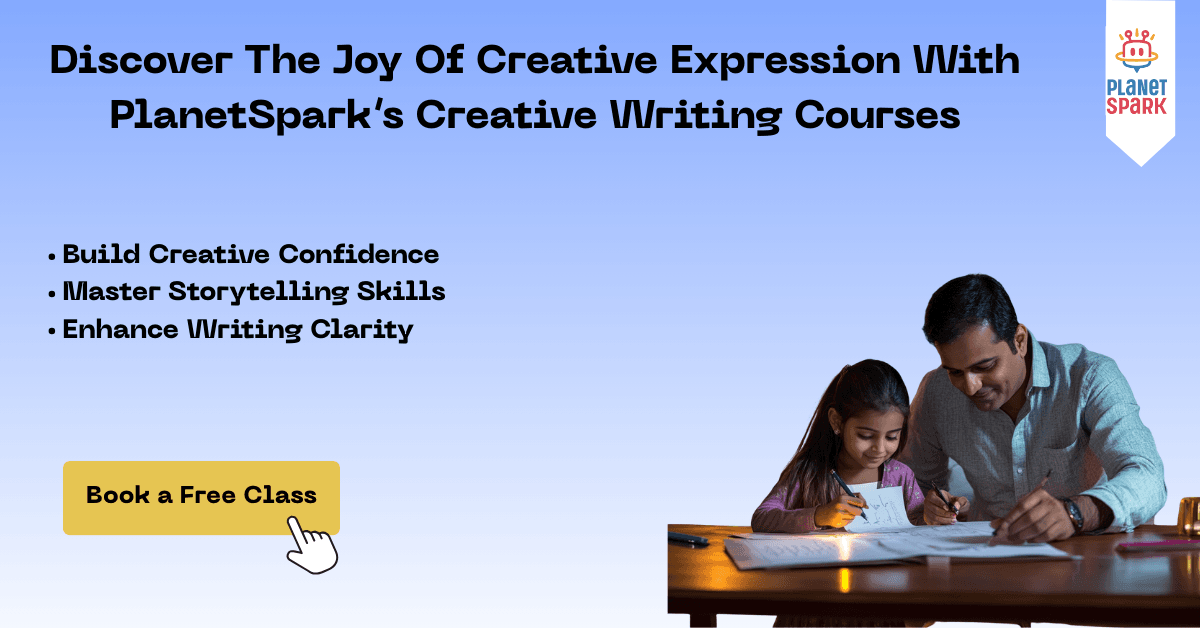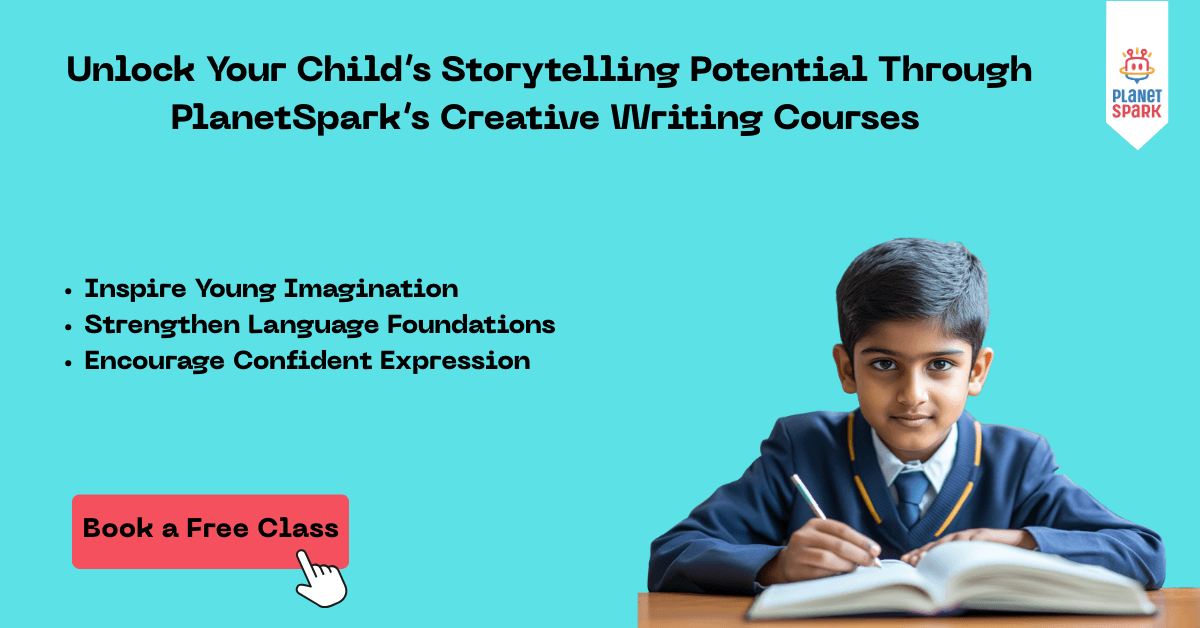Story Writing for Preschoolers | PlanetSpark Programs
Last Updated At: 8 Sep 2025
8 min read

Table of Contents
- Why Story Writing For Preschoolers Matters
- How Storytelling And Early Writing Predict Later Success
- What Makes An Effective Preschool Story Writing Program
- PlanetSpark’s Approach To Preschool Story Writing
- Curriculum Design And Story Writing Progression
- Story Writing Activities And Worksheets
- Benefits Of Story Writing Courses For Preschoolers
- Teacher’s Profile
- Conclusion
Early childhood is a golden window for growth. The skills children develop between ages two and five shape their foundation for school, communication, and self-expression. At this stage, children are bursting with imagination, curiosity, and a natural love for stories. Introducing story writing at this age is not about producing polished work but about cultivating the ability to think creatively, sequence ideas, and build early literacy skills. By guiding children to tell and write their own stories, we nurture their confidence, encourage expression, and help them transition smoothly into primary school.
PlanetSpark’s Creative Writing Courses are designed to unlock this potential in preschoolers. The program blends structured lessons with playful activities, combining one-to-one mentorship, AI-enabled practice, and gamified learning to make storytelling both fun and purposeful. With a personalised approach, children build strong foundations in writing and speaking while enjoying every step of the learning journey. This blog explores why story writing matters for preschoolers, how PlanetSpark’s curriculum works, the benefits for your child, and practical ways parents can support this exciting stage of development.
Why Story Writing For Preschoolers Matters
The Developmental Window For Language And Literacy
Children experience a rapid vocabulary explosion and increased sentence complexity between ages two and five. This developmental stage is the perfect time to introduce storytelling. When children attempt to narrate or write stories, they practice holding ideas in memory, sequencing them, and translating thoughts into words. This helps develop essential literacy skills that later support fluent reading and comprehension.
Story Writing As A Holistic Skill Builder
Story writing strengthens multiple developmental areas at once. Children learn to listen carefully, build vocabulary, apply grammar, and exercise fine motor skills while writing letters and words. They also practice organising thoughts into a beginning, middle, and end, supported by transition words such as “first,” “next,” and “finally.” These transferable skills make children more confident communicators in every subject, supporting areas such as English Speaking Skills For Kids.

How Storytelling And Early Writing Predict Later Success
Long-term studies have shown that early writing attempts, such as drawing, scribbling, or invented spelling, predict later literacy outcomes. When children regularly tell and record stories, they internalise sentence structure, narrative flow, and phonetic awareness. These skills make the process of learning to read and write in school more natural and less intimidating. Storytelling also nurtures creativity, empathy, and critical thinking, all of which contribute to lifelong success. A strong base in preschool years also prepares them for programs like Reading Training For Kids.
What Makes An Effective Preschool Story Writing Program
Oral First Approach
Children must first learn to tell stories orally before moving into writing. Oral storytelling builds vocabulary and helps them practice narrative sequencing without the added pressure of handwriting. Teachers model thinking aloud, encouraging children to describe characters, problems, and events.
Scaffolding And Gradual Release
Effective teaching involves modelling, guiding practice, and then encouraging independent attempts. A preschool child may begin with teacher dictation or captioned drawings before moving to short sentences of their own. This gradual release builds confidence and reduces frustration.
Personalisation And Small Group Attention
Each child develops at their own pace. Some are ready to write sentences by age four, while others need more time. Small class sizes or one-to-one attention allow instructors to adapt lessons to individual needs, ensuring no child feels left behind.
Play-Based And Multimodal Learning
Preschoolers learn best through play. By incorporating role-play, puppetry, drawing, and games, teachers make the abstract idea of a story concrete. Visuals and sensory activities help children connect imagination with expression.
Consistent Feedback
Feedback must be immediate, positive, and constructive. Instead of correcting mistakes harshly, teachers highlight strengths and gently guide improvements. For example: “Great character! Can you think of something exciting that happens to them?”
Parent Engagement
When parents reinforce classroom learning at home, children progress faster. Reading aloud, encouraging story retelling, and helping with picture journals all strengthen classroom gains. Teachers and parents should collaborate to make practice consistent and enjoyable, much like the approach used in Grammar Classes For Kids.
PlanetSpark’s Approach To Preschool Story Writing
PlanetSpark combines personalised teaching with technology and engaging activities to make story writing impactful.
One-to-One Personal Trainers
Every child works with a certified communication trainer. Trainers adapt lessons to the child’s pace, provide instant feedback, and build skills in storytelling, grammar, and public speaking. This mentorship builds a strong bond that motivates consistent learning, similar to the method used in Public Speaking Classes For Kids.
Personalised Learning Roadmap
An initial assessment identifies strengths and gaps. A customised roadmap then guides learning across vocabulary, fluency, grammar, and sentence formation. Milestones are regularly updated based on progress.
SparkX AI Video Analysis
Children record short storytelling sessions. SparkX analyses voice clarity, grammar, pacing, and organisation, producing detailed reports for trainers and parents. This helps track measurable progress and guide targeted improvements.
AI-Led Practice Sessions
Children can practise independently using AI-driven exercises. These activities simulate storytelling and provide real-time feedback on fluency, pacing, and expression. This makes practice more consistent even outside class hours.
Spark Diary
Children maintain a digital journal to write reflections, stories, and poems. Daily journaling builds consistency, improves writing fluency, and enhances creativity over time.
Gamified Learning
Interactive games such as vocabulary quizzes, spelling challenges, and grammar competitions make learning fun. These games encourage revision and create excitement around mastering skills.
Parent Teacher Meetings
Regular meetings ensure parents stay informed about progress. Trainers share performance data, highlight strengths, and discuss action plans for further development.
Progress Reports
Parents receive structured reports evaluating their child’s content quality, critical thinking, grammar, delivery, and confidence. Trainer notes provide actionable suggestions for continuous growth.
Clubs And Communities
Exclusive clubs such as Story Writing Club, Debate Club, and Speech Circles allow children to collaborate, perform, and learn socially. These platforms build leadership and teamwork skills while nurturing creativity.
Sparkline Safe Sharing
Sparkline is a secure platform where children share their stories, speeches, and creative work. Peer appreciation builds digital confidence while ensuring safety.
Contests And Recognition
Storytelling contests, open mic sessions, and showcases give children regular opportunities to shine. Certificates and recognition motivate them to keep improving.
SparkBee And SparkShop
SparkBee offers daily grammar and vocabulary quizzes, while SparkShop provides eBooks covering literacy skills. Together, they make learning engaging and accessible.
Curriculum Design And Story Writing Progression
PlanetSpark’s curriculum is designed to grow with the child.
Phase One: Foundations (Ages 2 To 3)
Focus: Oral storytelling, drawing, scribbling, name-writing
Activities: Read-aloud sessions, picture retelling, captioned drawings
Goal: Retell two to three events orally and attempt letter shapes
Phase Two: Emerging Writers (Ages 3 To 4)
Focus: Invented spelling, simple sentences, transition words
Activities: Box of words game, labelled drawings, sequencing stories
Goal: Write short captioned sentences and use transition words
Phase Three: Early Sentence Writers (Ages 4 To 5)
Focus: Multi-sentence stories, basic punctuation, character, and setting
Activities: Guided story writing, journaling, peer-sharing
Goal: Write a short, coherent story with a clear beginning and ending
This curriculum progression also prepares children for other structured courses like Phonics Letter Sound Course, which complements writing by strengthening reading and sound recognition.
Story Writing Activities And Worksheets
Write A Story
Children use transition words like “first,” “next,” and “finally” to narrate daily experiences. This helps them learn sequencing.
Box Of Words
In this group activity, children receive random words and must use them to create a story. It builds teamwork and creativity.
Reading Books
Reading aloud exposes children to different story structures. Parents can encourage discussions about favorite characters or endings.
Visit To the Zoo Story
Children are prompted to write about a familiar outing, such as a zoo visit. This activity connects personal experiences with storytelling, just like Fun Learning Activities For Kids do at home.

Benefits Of Story Writing Courses For Preschoolers
Children learn to tell and write stories with confidence
Writing becomes less intimidating as habits form early
Strong foundations are built for primary school success
Creativity and imagination are actively nurtured
Small class sizes ensure personal attention and foster Confidence Building For Kids
Teacher’s Profile
PlanetSpark trainers are experienced educators with degrees and strong communication skills. They pass a rigorous aptitude test and are trained to make classes engaging and supportive. Trainers act as mentors who inspire children to love learning. Learn more about PlanetSpark Trainers and their teaching expertise.
Conclusion
Story writing for preschoolers is not just about words on paper. It is about developing creativity, expression, literacy, and confidence during a critical stage of growth. With PlanetSpark’s personalised teaching, AI support, gamified learning, and strong parental involvement, preschoolers can build skills that will benefit them for years to come. Encouraging children to imagine, narrate, and write their own stories prepares them for success in school and beyond.
Frequently Asked Questions
Yes, PlanetSpark offers trial classes where you and your child can experience the program before enrolling.
The course prepares your child for school by strengthening literacy, creativity, and expression. It improves vocabulary, grammar, and confidence.
Through play-based, activity-driven lessons that focus on characters, plots, and endings. Learning feels like a game.
The course covers idea generation, building characters, plot, setting, revision, and even book cover design in age-appropriate ways.
The core skills include narrative, descriptive, persuasive, and expository writing, all taught gradually.
Children learn characters, setting, storyline, conflict, and resolution, which bring stories to life.
Yes. With guidance, preschoolers can begin writing short stories using drawings, words, and sentences. These skills develop naturally with practice.
Personalized Communication Report
Record a video to get a AI generated personalized communication report for your child
Select Learner's Class

Hi There, want to try these
tips for your child with
LIVE with our expert coach?
Let's check your child's
English fluency
